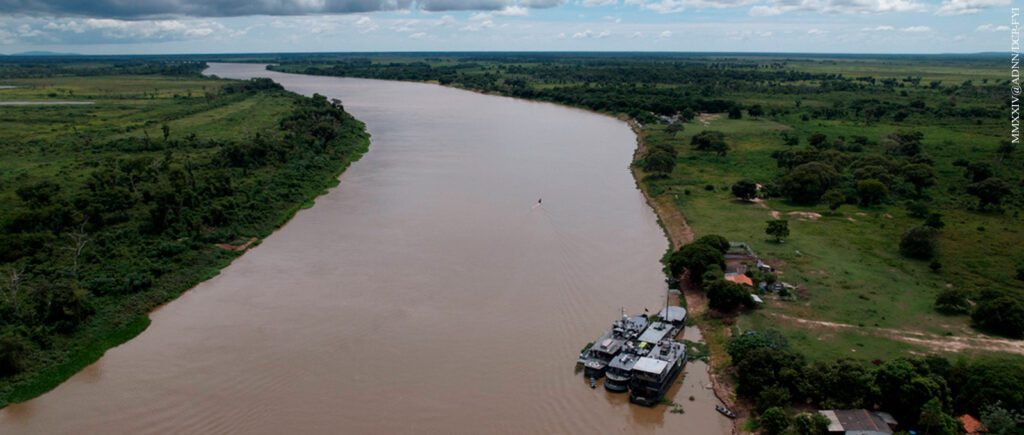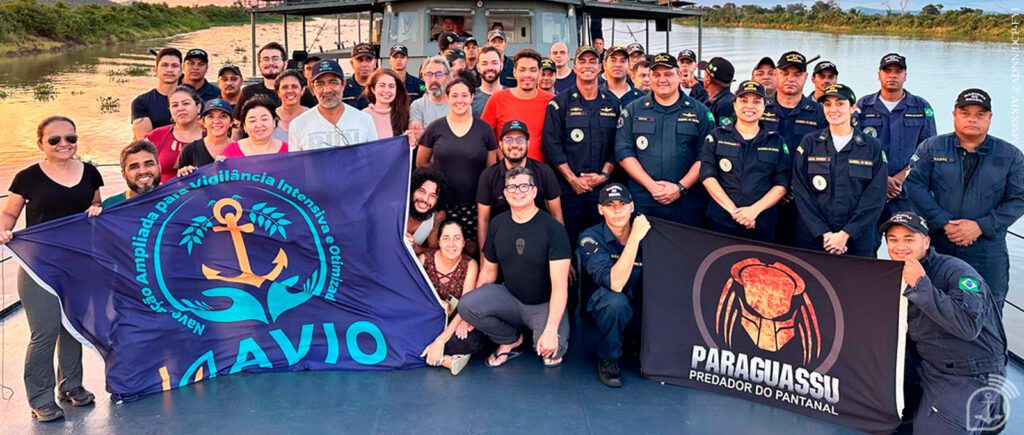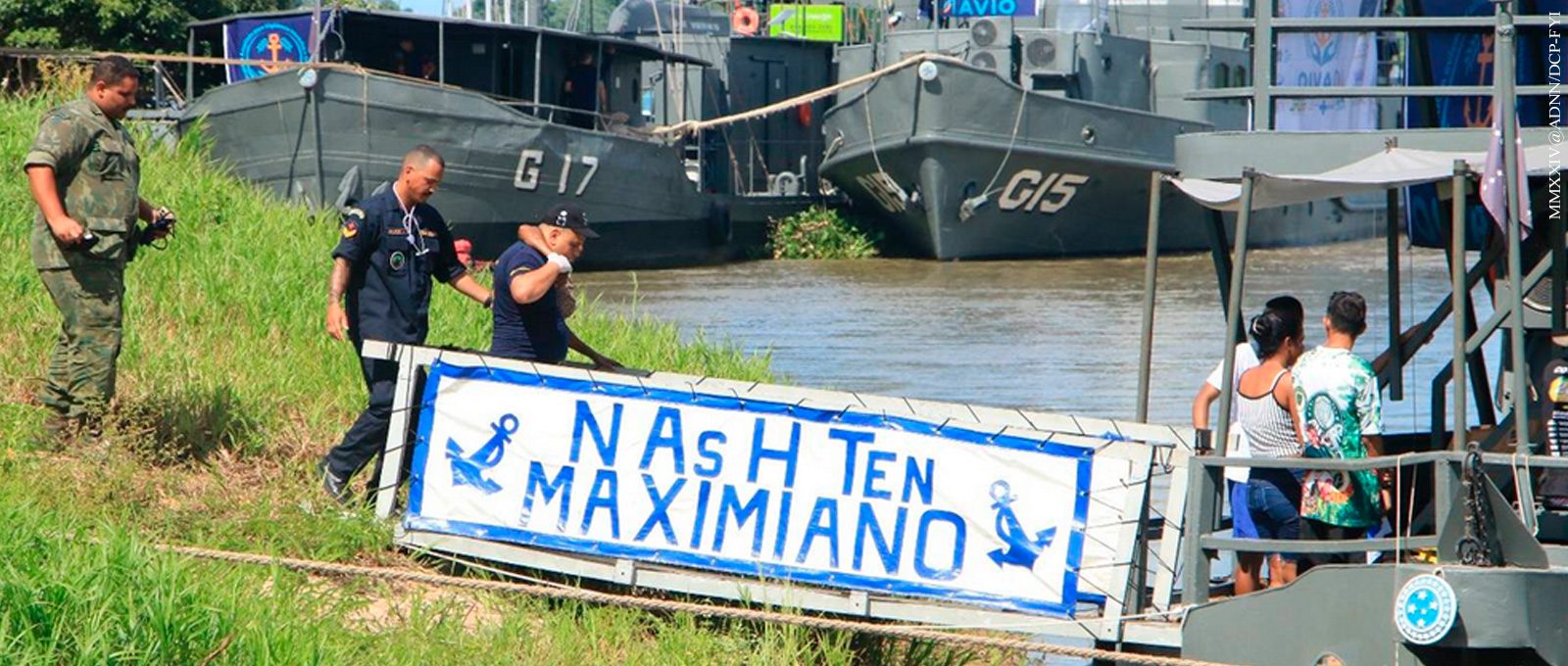Action by the Brazilian Navy and Fiocruz aims to study human, animal and environmental health
By First Lieutenant (RM2-T) Melina Aita Isquierdo – Ladário, MS
After 1,325 km covered in 32 days of navigation on the Paraguay River, the second stage of the Navio Project (Expanded Navigation for Intensive and Optimized Surveillance) came to an end last Friday (15). The action is being carried out by the Brazilian Navy (MB), the Oswaldo Cruz Foundation (Fiocruz), the Health Secretariats of Mato Grosso (MT) and Mato Grosso do Sul (MS), as well as national and international researchers.
With the support of the Fluvial Logistics Support Ship (NApLogFlu) “Potengi”, the Fluvial Transport Ship (NTrFlu) “Paraguassu” and the Hospital Assistance Ship (NAsH) “Tenente Maximiano”, under the Mato Grosso Flotilla Command (ComFlotMT), members of the project visited eight riverside communities in the Pantanal, from Ladário (MS) to Cáceres (MT). During this period, 498 people received medical, dental and laboratory care. The actions included the communities of Paraguai Mirim, Porto Domingos Ramos, Barra de São Lourenço, Fazenda Amolar, Porto São Francisco, Porto São Pedro, in Mato Grosso do Sul; and Santo Antônio das Lendas and the Carne Seca region, in Mato Grosso do Sul.
In all, 1,583 medical and nursing procedures were carried out, 1,409 dental procedures and 14,818 medicines distributed. There were also 170 doses of vaccines against Influenza, Hepatitis, Covid-19, HPV, Yellow Fever, Triple Viral, among others. Clothes were donated by MB military personnel, their dependents and project members, as well as 108 clay filters and 203 food baskets, donated by the Health Secretariats of MS and MT, respectively,
The aim of the Navio Project is to identify viral pathogens circulating in the riverside communities of the Pantanal in MT and MS and to study the impact of climate change on public health. “The initiative is based on the concept of One Health and integrates the study and relationship between human, animal and environmental health. Through the tests collected, we will be able to detect the viruses and bacteria circulating in the riverside populations so that we can target medical care and promote public policies for the prevention and treatment of these diseases,” explained project coordinator and Fiocruz researcher Luiz Alcântara.

Laboratories
The river dwellers assisted in the communities underwent a general screening, blood sample collection and a swab test. Using the materials collected and water from the houses and the river, researchers carried out analyses on board the ships, in laboratories set up on the NApLogFlu “Potengi” and the NTrFlu “Paraguassu”. A laboratory was also set up for genetic sequencing of the viruses and bacteria detected and classification of the mosquitoes collected in the localities visited.
During visits to the communities, researchers collected blood and feces from animals, including chickens, geese, horses and donkeys, in order to detect animal diseases circulating in the region. The team also vaccinated 208 dogs and cats against rabies.
In all, 2,653 rapid tests were carried out for Covid-19, Hepatitis B and C, Syphilis, Malaria, Human Visceral Leishmaniasis, Chagas and Leprosy; 4. 603 molecular and serological tests, with the aim of identifying the type of pathogen and analyzing the immunity of river dwellers to Dengue, Zika and Chikungunya; 116 stool samples were analyzed, with 75% positive for intestinal parasites; and 78 water samples from the houses, 59% of which were positive for fecal coliform bacteria, indicating that they were unfit for consumption.
As part of the research, genetic mapping of the diseases detected was also carried out, to identify variants and check for new viruses and bacteria circulating in the Pantanal region. So far, researchers have mapped the complete genome of 25 respiratory viruses, two partial sequences of Chikungunya and detected 230 genera of bacteria, more than 50% of which are species of bacteria that cause human diseases.
“The project expands the activities already carried out by the ComFlotMT ships in terms of medical and dental care, enabling the MB to contribute to scientific research in the country and to improving the quality of life of the riverside dwellers in the two states,” said the Commander of the 6th Naval District, Vice Admiral Iunis Távora Said.
For river dweller Leonida de Souza, from the Barra do São Lourenço community, located around 200 km from Corumbá (MS), the ships’ visit is an opportunity for her family to undergo dental and medical procedures and receive medication. “Because we’re far from the city, it’s very expensive to take the whole family for consultations. We put up with our pain with home remedies until we have the opportunity to receive help from the Navy ships,” she said.

Southern section
The first stage of the project took place from November 20 to December 10, 2023, on the South Branch of the Paraguay River, from Ladario to Porto Murtinho (MS). On that occasion, the project visited five riverside communities: Porto Murtinho, Forte Coimbra, Porto Esperança, Porto Morrinho and Porto da Manga, in MS.
Source: Agência Marinha de Notícias *** Translated with www.DeepL.com/Translator (free version) ***
